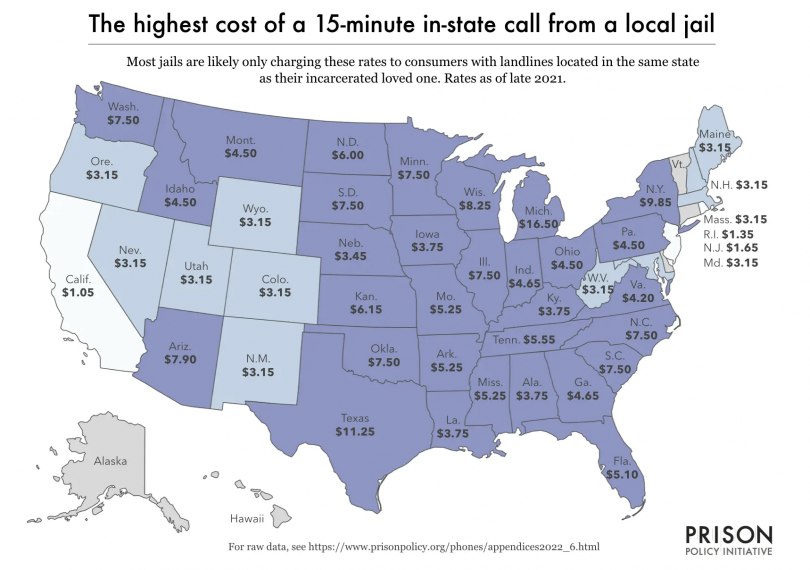As of January, a new federal law, the Martha Wright-Reed Just and Reasonable Communications Act, gives the Federal Communications Commission (FCC) the power to regulate the price of video calls in prisons and jails across the nation.
Families of incarcerated people often have to pay for phone calls, video calls, emails, and money transfer fees to stay connected with their loved ones in lockup. For decades, private prison vendors have charged exorbitant rates for communication, commissary, and other services, leaving low-income families stuck with bills that frequently add up to hundreds of dollars per month, while kicking some of their earnings back to the corrections facilities that engage their services.
Still, call rates vary widely, according to the Prison Policy Initiative. Some jail systems have recently begun offering calls for free, or for a few cents per minute, while the highest rate is $16.50 for a 15 minute call in Berrien County, Michigan, followed by $11.25 in two Texas counties. In Nassau County, New York, incarcerated people are charged $4.35 for the first minute of a phone call, followed by $.40 a minute.
The tide is starting to shift, however, as the federal government, states, and local jurisdictions are starting to do something about the problem.
In 2020, San Francisco became the first California jurisdiction to provide incarcerated people with free calls by negotiating a flat-rate contract with the for-profit prison vendor ViaPath, then known as Global Tel*Link. San Diego County followed suit in 2021, eliminating the $.33-per-minute fee for in-state calls and $.21 per minute fee for out-of-state calls, and making video visits free.
In December 2020, the California Department of Corrections and Rehabilitation renewed their contract with Viapath. The contract marked a reduction in rates for phone and video calls, as well as emails and other services GTL provides.
This contract set rates at $.025 per minute for regular phone calls, $.20 per minute for video calls, and $.05 for emails and other electronic messages. The state prison system also gives incarcerated people 15 minutes of free phone calls and 15 minutes of free video calls every two weeks.
Rates for voice calls have been capped temporarily by the California Public Utilities Commission at $.07 per minute for calls made within state.
And under SB 1008, a law passed in 2022, people detained in California’s prisons and jails will be able to make free phone calls to their family and friends.
Still the price of video calls is as high as $15 for 20 minutes (equal to $.75 a minute) in Glenn County, CA. Of the 34 California county jail systems from which PPI gathered data, 13 charged $9 or more for a 30 minute video call.
Correctional officials praise video calls as a way for people who are incarcerated far from their families, or whose loved ones cannot travel for in-person visits, to maintain connections. They were certainly important during the pandemic, when visits were halted for many months. Outside of the pandemic, counties have also had the audacity to stop in-person visits and replace them with often prohibitively expensive video calls.
Under the new Martha Wright-Reed Act, the FCC will be able to regulate video calls. The Act also closes a loophole by clarifying the FCC’s power to set limits on regular phone calls in prisons and jails, after a federal appellate court ruled that the commission lacked the authority to do so.
“Too many families of incarcerated people must pay outrageous rates to stay connected with their loved ones,” FCC Chairperson Jessica Rosenworcel said in response to the passage of the Martha Wright-Reed Act. “This harms the families and children of the incarcerated—and it harms all of us because regular contact with kin can reduce recidivism.”


I pay
I don’t care about some heartless coward who is locked up for victimizing an innocent human being.
I think they should be taxed heavily for their calls,, they should have to pay for meals, the electricity lighting their cells, and the water flushing their human waste.
If they don’t have the money, they can ask their family members and friends for support. If they still don’t get the money to pay for it, turn their lights off, cut the water to their cell, and let them starve. If they starve to death, their family and friends can pick up the remains. If family and friends can’t make the trip, torch the carcass and spread the remains in a landfill.
I’d much rather see my tax dollars go toward counseling for victims, crime prevention efforts, keeping schools safe, safe passage to and from school for children, and cleaning the drug addicted thieving homeless from our streets,
To Mutually Assured Destruction and those like-minded.
To qualify as a human being, one first demonstrate the capacity to exhibit compassion. You appear lacking in this regard.
First, family such as a brother, father or son, committed no crime to be abused in such way.
Second, not all convictions are sound.
Finally, Natural Law and economics, and God if you so believe, indicate preference for redemption.
Perhaps you need more saving than the incarcerated.